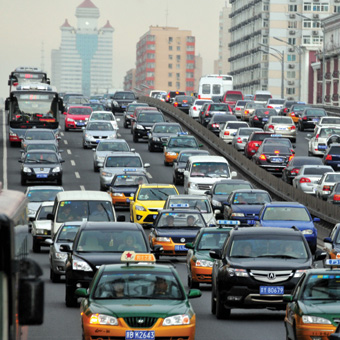When it comes to economic growth, the express lanes are closed.
You've probably heard friends complain about tie-ups in Los Angeles or Chicago or New York that transform already long commutes into sweaty practice runs for purgatory. But nothing compares to what motorists recently endured on a roadway heading into Beijing in August's mother-of-all traffic jams: an 11-day, diesel-clouded snarl, stretching more than 62 miles and entrapping thousands of trucks and motorists trying in vain to snail into China's capital city.
Roadwork and a handful of accidents were blamed, but the real culprit may have been China's voracious appetite for coal. Hundreds of truckers were moving illegally mined coal along a specific route, choking the highway system in an effort to avoid government inspectors.
Coal powers 70 percent of China's energy. It's an essential component of the Middle Kingdom's spectacular economic growth over the last two decades. Economic growth has rejuvenated China and moved millions of people out of abject poverty. But, as the DeMille-ish traffic jam suggests, unrestrained growth is not without its own risks.
Folks in the United States may be tempted to look at China's growth pains with envy as container ships that arrive full from mainland factories languish in America's ports, waiting in vain for cargo for the return trip. As in China, the average citizen in the United States has been taught the mantra that economic growth is the answer to virtually all that ails us, including the nation's current social and fiscal breakdown. If only we could export more, produce more, consume more, our unemployment and housing crises would disappear in a puff of economic fairy dust.
This may seem an inopportune moment to question that strategy, but what if that assumption is a bright, shining lie? The Great Recession has taken a terrible toll around the nation, with poverty and unemployment rates that threaten Dust Bowl records and America's vast but declining middle class awakening to the reality of deeply reduced expectations. Incomes are dormant or sagging; more and more people are living paycheck to paycheck. Unable to raid exhausted home equity, many are dipping into retirement packages.
Again growth (and tax cuts for the nation's wealthiest) is championed as the way out. But the Great Recession threatens to overwhelm everything. The Center for American Progress calls it a Katrina for the rest of the nation, washing away jobs, nest eggs, McMansions, and, if we're fortunate, perhaps our delusions of even reduced grandeur.
The Chinese don't have to take any lessons from Americans on consumption. They are going full throttle. When all of its citizens begin to consume at the current level of American consumers, the planet is likely to face some difficult questions that will make solving Beijing's traffic congestion seem like child's play.
Will we be able then, with other industrial giants like China, to begin to ask the questions we have been dodging for decades? What if, prodded by our great environmental and economic crises, we begin to challenge the imaginative primacy of growth? Progressive economists talk about steady-state and sustainable growth models: How might we shape those alternative models into a practical reality?
The church teaches that human beings are more than just cogs in a vast socio-economic machinery, that we are more than just the amount we can consume and the dollars we can earn. We are better than that. Our economy is teaching us that the hard way. We are emptying our wallets now, not to buy more stuff, but to pay down debt and put money in the bank, purchasing our increasingly rare indulgences the old-fashioned way: by earning them.
The good news is that having less stuff doesn't necessarily mean having less happiness. You won't find a single advanced industrial economy in the top 20 of the World Happiness Index, an alternative measure of economic performance that factors people a little ahead of output. Maybe we could start trying to fill the emptiness in our hearts and heads instead of the empty spaces of our houses and apartments.
Maybe we still have something to teach our brothers and sisters in China: how to wind it down without losing anything.
This article appeared in the November 2010 issue of U.S. Catholic (Vol. 75, No. 11, page 39).
Image: Fan Jiashan/Newscom














Add comment